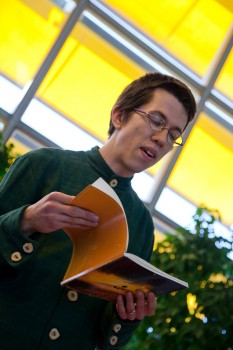So close to me
19 August 2010 | Reviews
Please try this first, before we enter the chamber of horrors. It’s a poem by Timo Harju:
… The old people’s home is the strange hand of God with which he strokes
his thinning hair,
a sudden shower of cackling in the dry linen closet, slightly
sad and lonely
God looks out, stirring his cup of tea as if it were on fire.
If Jesus had lived to grow old and gone into an old people’s home,
he would have been like these.

Timo Harju was awarded the 2009 Kritiikin kannukset prize (‘the spurs of criticism’, 2009) of the Finnish Critics' Association, SARV. Photo: Pia Pettersson
This spring a young Finnish female nurse was sentenced to life imprisonment for using insulin to murder a 79-year-old mentally retarded patient. Not long after, sentence was passed on another nurse – this time a meek and submissive-looking middle-aged woman who had murdered a whole series of elderly patients with overdoses of medication.
These are the terms – those of ordinary crime journalism – in which our recent public discussion of long-stay care of the elderly here in Finland was conducted. The discussion was followed by the usual misery of cuts, unchanged diapers, dehydration, over-medication, poor wages for hard work… No wonder that the concept of ‘healthcare wills’ and ‘living wills’, in which people are supposed to say how they want to be cared for in the last stage of their lives – is acquiring a disturbing undertone of ‘better jump before you’re pushed.’
This is dangerous. Horror and social pornography are becoming the dominant genre of reporting on the care of the elderly. The horror is a part of the truth, but in the absence of any counter-balancing narrative – the stories of good care, compassion, humour, grief, the preservation of individuality all the way to the moment of death – it simply leads to impoverishment of the imagination, and paralysis.
For this reason Timo Harju’s first collection Kastelimme heitä runsaasti kahvilla (‘We watered them abundantly with coffee’, Ntamo, 2009) is important and ground-breaking in not only a literary sense but also an ethical one.
The poems are based on his experience of working as a community service helper at a Finnish nursing home – a working environment filled with dentures, non-spill coffee mugs, diapers, dementia.
And don’t get the wrong idea – this is real poetry. The work involves communicating with people whose words and syntax are wasting away, or for whom the most basic routines of dressing, eating and taking care of personal hygiene are bizarre adventures.
It is work that not only requires physical strength and unshockability but also considerable linguistic prowess.
Harju (born 1980) has confronted the task with emotional openness and intellectual curiosity, describing it in different ways that range from things like
Hilma is a lozenge box full of talk, rattling and rustling to herself at the table.
One morning I went into her room: LOZENGE STORM
to
A dark toilet. Dingy clotheshangers. A dingy woollen blanket. At least five water mugs in different parts of the room. A dent. A wisp of hair. A wind. A white, flameless candle. The door a wobbly milk tooth. A crackling, a corridor. Blind stairs. Let loose.
There is something deeply ideological about Harju’s poetic project, his attempt to portray care work from a point of view other than that of social pornography. Devoid of all cutesiness or embellishment, he writes in an astute and nuanced way about the terrible, moving, sad but nonetheless valuable aspects of being old and needy. And I think that one of his aims is to make us understand something of vital importance about ourselves and our own destinies.
Each morning the nurses pull on rubber boots and leave
for the dark dark, for a dark swamp, in the dark swamp
when the gnarled pines howl, only a pack of diapers for a lamp.
Cotton-grass on granddad’s head, violence and homesickness they leave
for the dark swamp, with all their sighs and strained nerves
along hands elbows into the bogholes. They bake cakes
and open the oven door into the night, to make it cheerful with the smell.
A prize would be nice, but the nurses aren’t on the winning side.
The same thing is true of poets – they are also very seldom on the winning side. But luckily they go on writing all the same.
Translated by David McDuff
Tags: poetry
No comments for this entry yet
Trackbacks/Pingbacks:

22 August 2010 on 8:19 pm
[…] […]